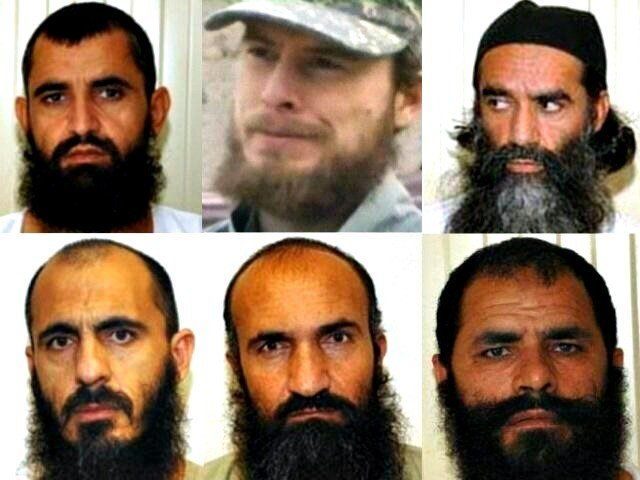The five high-risk Taliban commanders released from the U.S. military prison in Guantánamo Bay, Cuba, by the previous administration in exchange for Bowe Bergdahl who was captured by the terrorist group after deserting his post in Afghanistan are now reportedly negotiating peace in the war-ravaged country with their former captors.
“During our time in Guantánamo, the feeling was with us that we had been brought there unjustly and that we would be freed,” Mullah Khairullah Khairkhwa, one of the Taliban Five, as the former Gitmo prisoners are now known, told the New York Times (NYT) in an article published Tuesday. “But it never occurred to me that one day there would be negotiations with them, and I would be sitting there with them on one side and us on the other.”
In December 2015, a report issued by the Republican-led House Armed Services Committee and congressional testimony by a U.S. Army lieutenant colonel revealed that multiple alternatives were on the table for former President Barack Obama’s administration despite his Pentagon chief’s assertion that releasing the terrorists was the only option to free the American prisoner.
Bergdahl was later convicted of desertion and misbehavior before the enemy, dishonorably discharged, and demoted to private.
Obama’s own Joint Task Force Guantanamo (JTF-GTMO) deemed each one of the Taliban five as a “high” risk to the United States and its allies.
Furthermore, senior intelligence officials told lawmakers that the top five Taliban commanders— Fazl Mohammad Mazloom, Mohammed Nabi, Abdul Haq Wasiq, Mullah Norullah Nori, and Khairullah Khairkhwa—were likely to return to terrorist activities against the U.S. if they were set free.
NYT does note that at least one of them — Mullah Mazloom — may be guilty of “mass killings and scorched-earth brutality,” adding that it obtained documents under a Freedom of Information Act (FOIA) request showing that the battle-hardened jihadi “showed no remorse.”
The December 2015 House panel report found that “at least three” of the Taliban fighters have resumed “threatening activities” after being released to Qatar from Guantánamo Bay in May 2014.
So, in a way, the five Taliban narco-jihadis are “lucky” to be sitting across from their captors as part of the terrorist group’s delegation discussing the U.S. military withdrawal to end the more than 17-year-old Afghanistan war.
The Times reported:
Now, in a stark demonstration of the twists and contradictions of the long American involvement in Afghanistan, five of those men are sitting across a negotiating table from their former captors, part of the Taliban team discussing the terms of an American troop withdrawal. …The five senior Taliban officials were held at Guantánamo for 13 years before catching a lucky break in 2014. They were exchanged for Sgt. Bowe Bergdahl, the only known American service member to be held by the insurgents as a prisoner of war.
Although they Taliban Five were reunited with their families in Qatar, home to the terrorist group’s primary political office, the Qatari authorities continue to keep a watchful eye on the jihadis at the request of the United States, the Times reported.
However, Qatar has long served as a safe haven for the Taliban and other terrorists. According to David Ibsen, the executive director of the non-governmental Counter Extremism Project (CEP), Qatar likely influenced the re-engagement in jihadist activities of some of the Taliban Five.
Taliban leaders made a point of ensuring the former Guantánamo prisoners participate in the ongoing negotiations in recent months.
Trump administration officials have intensified peace negotiations with the group in recent months, angering Afghan President Ashraf Ghani’s team, which has so far not been allowed to participate in the discussions at the behest of the Taliban.
The Taliban — which has stepped up the fight to implement strict Islamic laws or sharia amid the negotiations — considers itself the only legitimate government, dismissing the Ghani administration as an American “puppet.”
Taliban narco-terrorists claim they will only talk to Kabul after the complete withdrawal of foreign forces.
The latest round of negotiations, which ended March 12, did yield two draft agreements — the eventual U.S. military withdrawal and counterterrorism assurances by the Taliban jihadis who do not believe themselves to be terrorists.
“During days of slow and at times frustrated discussions at the most recent session, which ended on March 12, it was the Taliban side that was often more emotional. Some gave impassioned speeches about how vital it was that the Americans completely leave Afghanistan in as little as six months,” the Times noted.
Besides Mullah Khairkhwa, the other Taliban Five members appeared reluctant to speak, NYT acknowledged.
The Taliban has rejected a reported offer by the Trump Pentagon of pulling out American troops within three to five years. Taliban jihadis had also repudiated the Trump administration’s proposal to leave behind a residual force to make sure the terrorists keep their promise of ensuring Afghanistan does not once again harbor international terrorists like it did with al-Qaeda when it was under the Taliban regime right before the September 11 attacks on the U.S. homeland.
It was the Taliban’s decision to shelter al-Qaeda that triggered the longest American war to date.

COMMENTS
Please let us know if you're having issues with commenting.